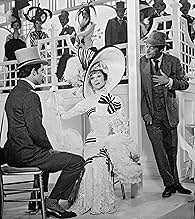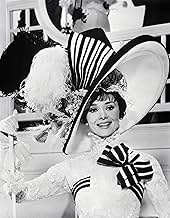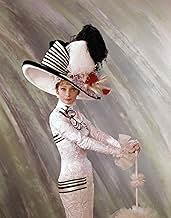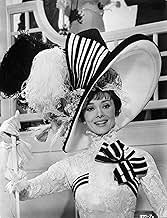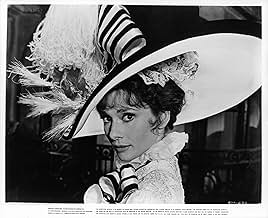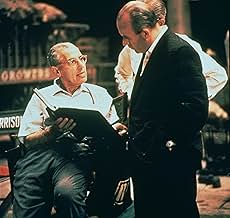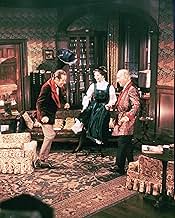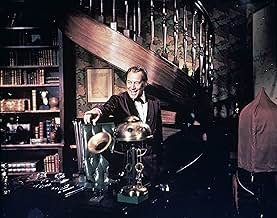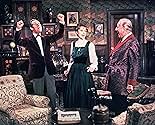My Fair Lady
- 1964
- Tous publics
- 2h 50m
In 1910s London, snobbish phonetics professor Henry Higgins agrees to a wager that he can make a crude flower girl, Eliza Doolittle, presentable in high society.In 1910s London, snobbish phonetics professor Henry Higgins agrees to a wager that he can make a crude flower girl, Eliza Doolittle, presentable in high society.In 1910s London, snobbish phonetics professor Henry Higgins agrees to a wager that he can make a crude flower girl, Eliza Doolittle, presentable in high society.
- Won 8 Oscars
- 26 wins & 13 nominations total
David Ahdar
- Ball Guest
- (uncredited)
- …
Elizabeth Aimers
- Cockney
- (uncredited)
Helen Albrecht
- Ascot Extra
- (uncredited)
John Alderson
- Jamie - Doolittle's crony
- (uncredited)
Mary Alexander
- Cockney
- (uncredited)
Gertrude Astor
- Cockney
- (uncredited)
LaWana Backer
- Ad Lib at Church
- (uncredited)
Walter Bacon
- Ball Guest
- (uncredited)
Featured reviews
I've seen MY FAIR LADY several times. However, it wasn't until last night that I finally saw the 1938 version of PYGMALION and this was very interesting indeed. It seems that MY FAIR LADY is actually NOT based on the George Bernard Shaw play as much as it's based on the Leslie Howard movie. That's because the dialog (particularly Henry Higgins') is often word-for-word that of the film. Additionally, both films have the same ending--one that is NOT the same as the original play. In the play, the ending was more sad but also much more realistic and consistent with the characters and their growth (or lack thereof in the case of Henry Higgins).
Quality-wise, both films are superb and I enjoyed them immensely. One very obvious difference is that MY FAIR LADY is a musical with lovely songs, so it's a much longer movie. Another is that although Leslie Howard did a very fine job, somehow Rex Harrison came off as grouchier and more entertaining in the lead. Another major difference is that MY FAIR LADY feels more like a comedy and PYGMALION feels much more sad and deeper emotionally. Because it is a bright and colorful musical, the characters in MY FAIR LADY seem a bit less real, but with PYGMALION you are almost brought to tears late in the film.
My recommendation is that you see them both. Both are exquisitely produced and acted and you can't go wrong with either one. I could say more in my review about this film, but considering that there are already a zillion other reviews, I'll end it here.
UPDATE--Only days after posting this review, I got quite a few "not helpfuls". I assume this is from fans who adored this 1964 film. Well, my response is that it can't merit anything more than an 8 because the dialog was directly lifted from the earlier film AND so much of the singing was NOT done by the stars themselves. To me, these are flaws that prevent the film from earning a higher score. And, while I think about it, cannot justify the many 10s I see for the film.
Quality-wise, both films are superb and I enjoyed them immensely. One very obvious difference is that MY FAIR LADY is a musical with lovely songs, so it's a much longer movie. Another is that although Leslie Howard did a very fine job, somehow Rex Harrison came off as grouchier and more entertaining in the lead. Another major difference is that MY FAIR LADY feels more like a comedy and PYGMALION feels much more sad and deeper emotionally. Because it is a bright and colorful musical, the characters in MY FAIR LADY seem a bit less real, but with PYGMALION you are almost brought to tears late in the film.
My recommendation is that you see them both. Both are exquisitely produced and acted and you can't go wrong with either one. I could say more in my review about this film, but considering that there are already a zillion other reviews, I'll end it here.
UPDATE--Only days after posting this review, I got quite a few "not helpfuls". I assume this is from fans who adored this 1964 film. Well, my response is that it can't merit anything more than an 8 because the dialog was directly lifted from the earlier film AND so much of the singing was NOT done by the stars themselves. To me, these are flaws that prevent the film from earning a higher score. And, while I think about it, cannot justify the many 10s I see for the film.
8dxia
During the first two hours of this movie, I had thought that it was the greatest musical ever brought to film. It's only during the last hour that it begins to languish and plod. If the first two hours are a solid 10/10, then the last hour is about a 4/10. It brings the average to about 8/10, which is exactly what I gave the movie, but it's fun to think about how great the movie could have been had the producers decided to find a better ending to an otherwise superb story.
It goes to show that film is a tricky medium, and regardless of how great musicals can be, live action simply isn't as interesting when it's recorded. 'My Fair Lady' could have used a bit of trimming, especially in Stanley Holloway's pieces, WITH A BIT OF LUCK and GET ME TO THE CHURCH ON TIME. Although they may have been spectacular to see on stage, movie audiences will yearn to see more about Eliza and wonder why the director spends so much time on her father.
On the brighter side, I believe that I have never seen Audrey Hepburn in a more perfect role. Eliza Doolittle is a lot like she, in their rise from poverty. And watching Audrey is like being invited to see a person shine in their most perfect niche. She isn't gorgeous in a modern sense, but even a decade after her death, her image still carries that immortal appeal. Some critics call it the "it" factor. We don't know what "it" is but we know it's there.
Billy Wilder once said, "God kissed her face, and there she was." For me, I just like her smile, and my smile when I watch her exuberance in one of the defining roles in her career.
It goes to show that film is a tricky medium, and regardless of how great musicals can be, live action simply isn't as interesting when it's recorded. 'My Fair Lady' could have used a bit of trimming, especially in Stanley Holloway's pieces, WITH A BIT OF LUCK and GET ME TO THE CHURCH ON TIME. Although they may have been spectacular to see on stage, movie audiences will yearn to see more about Eliza and wonder why the director spends so much time on her father.
On the brighter side, I believe that I have never seen Audrey Hepburn in a more perfect role. Eliza Doolittle is a lot like she, in their rise from poverty. And watching Audrey is like being invited to see a person shine in their most perfect niche. She isn't gorgeous in a modern sense, but even a decade after her death, her image still carries that immortal appeal. Some critics call it the "it" factor. We don't know what "it" is but we know it's there.
Billy Wilder once said, "God kissed her face, and there she was." For me, I just like her smile, and my smile when I watch her exuberance in one of the defining roles in her career.
Marni Nixon's singing in both THE KING AND I and WEST SIDE STORY sounded purer to me than did her work in MY FAIR LADY; I thought this was fine, but somewhat thinner and less rich (the voice may well have thinned a little by then). It's lovely to hear Hepburn in "Just You Wait," as it comes as something of a surprise if you had thought all of her singing was dubbed, as I once had. The dubbing and acting do seem to come to a perfect luminous moment at least once: at the end of "I Could Have Danced All Night" it seems as if Audrey Hepburn is really singing it and gives the impression that possibly no one else ever had. It is possible that the best result might have been to let some of the other simpler songs, like "Wouldn't It Be Loverly" be done by Hepburn, and leave those obviously requiring a more technically accomplished singer to Nixon.
It is interesting that Hepburn's "Moon River" is not included on the old soundtrack of BREAKFAST AT TIFFANY'S. Similarly, I went to her memorial service at the 5th Avenue Presbyterian Church here in New York in 1993, and, uncannily, the entire program was listed EXCEPT that... all of a sudden they played her "Moon River" and the whole church became very emotionally charged. I think we were grateful that this let us experience our grief directly by forcing something immediate (but not cruel) on us like that.
I have always been glad anyway that Hepburn did the part and it is certainly the only real reason the film still has life--the controversy about her getting the part may have as much to do with that "life" as anything: it would be a mere artifact, a duplicate of the stage production had Julie Andrews been chosen. Andrews still seems primarily a stage star despite all the movies she made. Most of them are mediocre,a few of them quite good even if I haven't found them interesting myself: she is perfect in THE SOUND OF MUSIC, but the phenomenal appeal of this film is based on something considerably less sharp than what made the earlier Rodgers and Hammerstein masterpieces great-- even when they weren't quite as lavishly produced. Clearly, for example, the score of SOUTH PACIFIC is light-years beyond that of THE SOUND OF MUSIC. Admittedly, Andrews's singing of the score is better than Mary Martin's was. And the voice you can still hear on the Broadway and London cast recordings of MY FAIR LADY is far more complex and rare than Nixon's is.
Still, she wouldn't have made the film unique: while it may or may not be a great film, it has managed to retain a one-of-a-kind quality, and is kept from being a mere facsimile.
It is certainly true that Ms. Nixon should have been credited for her work, whatever our other reservations are. I nevertheless think that some of the lighter opera voices of the time--maybe Anna Moffo or Mirella Freni--would have been better (I don't think Ms. Nixon was "too fine," but rather not quite as good here as she once had been.) Dubbing doesn't have to "match" all that perfectly; of course, certain examples--like Giorgio Tozzi for Rossano Brazzi as Emile de Becque do seem perfect. And if the case of MEETING VENUS is somewhat different, no one ever would dream of worrying about Kiri TeKanawa's voice not matching Glenn Close (Ms.Close unfortunately let us hear her real one doing Wagner on Entertainment Tonight when plugging the film--a harsh and strident moment...)
This is one of quite a number of cases in which the original star was controversially replaced. The strangest may be the rejection of Ethel Merman for GYPSY, although Rosalind Russell was excellent. The smartest may have been Barbra Streisand for Carol Channing for HELLO, DOLLY! She was high-voltage enough for the gargantuan production and her trumpet-like singing was magnificent--a number of us think this is her best film--and it ages fantastically. And, while it is not a matter of replacing a role originated by someone else, Hepburn herself was loudly denounced for BREAKFAST AT TIFFANY'S by Truman Capote; we think of the role as her indelible mark (and surely it is in some ways), but his preference for Marilyn Monroe could have unquestionably led to something extraordinary also--and maybe that idiotic ending that is so hard to overlook would have been replaced by the much more subtle and meaningful one Capote wrote.
It really is Audrey Hepburn who makes MY FAIR LADY continue to "do its work." And in it we may have well seen the most gloriously ripe moment of her incredible beauty.
It is interesting that Hepburn's "Moon River" is not included on the old soundtrack of BREAKFAST AT TIFFANY'S. Similarly, I went to her memorial service at the 5th Avenue Presbyterian Church here in New York in 1993, and, uncannily, the entire program was listed EXCEPT that... all of a sudden they played her "Moon River" and the whole church became very emotionally charged. I think we were grateful that this let us experience our grief directly by forcing something immediate (but not cruel) on us like that.
I have always been glad anyway that Hepburn did the part and it is certainly the only real reason the film still has life--the controversy about her getting the part may have as much to do with that "life" as anything: it would be a mere artifact, a duplicate of the stage production had Julie Andrews been chosen. Andrews still seems primarily a stage star despite all the movies she made. Most of them are mediocre,a few of them quite good even if I haven't found them interesting myself: she is perfect in THE SOUND OF MUSIC, but the phenomenal appeal of this film is based on something considerably less sharp than what made the earlier Rodgers and Hammerstein masterpieces great-- even when they weren't quite as lavishly produced. Clearly, for example, the score of SOUTH PACIFIC is light-years beyond that of THE SOUND OF MUSIC. Admittedly, Andrews's singing of the score is better than Mary Martin's was. And the voice you can still hear on the Broadway and London cast recordings of MY FAIR LADY is far more complex and rare than Nixon's is.
Still, she wouldn't have made the film unique: while it may or may not be a great film, it has managed to retain a one-of-a-kind quality, and is kept from being a mere facsimile.
It is certainly true that Ms. Nixon should have been credited for her work, whatever our other reservations are. I nevertheless think that some of the lighter opera voices of the time--maybe Anna Moffo or Mirella Freni--would have been better (I don't think Ms. Nixon was "too fine," but rather not quite as good here as she once had been.) Dubbing doesn't have to "match" all that perfectly; of course, certain examples--like Giorgio Tozzi for Rossano Brazzi as Emile de Becque do seem perfect. And if the case of MEETING VENUS is somewhat different, no one ever would dream of worrying about Kiri TeKanawa's voice not matching Glenn Close (Ms.Close unfortunately let us hear her real one doing Wagner on Entertainment Tonight when plugging the film--a harsh and strident moment...)
This is one of quite a number of cases in which the original star was controversially replaced. The strangest may be the rejection of Ethel Merman for GYPSY, although Rosalind Russell was excellent. The smartest may have been Barbra Streisand for Carol Channing for HELLO, DOLLY! She was high-voltage enough for the gargantuan production and her trumpet-like singing was magnificent--a number of us think this is her best film--and it ages fantastically. And, while it is not a matter of replacing a role originated by someone else, Hepburn herself was loudly denounced for BREAKFAST AT TIFFANY'S by Truman Capote; we think of the role as her indelible mark (and surely it is in some ways), but his preference for Marilyn Monroe could have unquestionably led to something extraordinary also--and maybe that idiotic ending that is so hard to overlook would have been replaced by the much more subtle and meaningful one Capote wrote.
It really is Audrey Hepburn who makes MY FAIR LADY continue to "do its work." And in it we may have well seen the most gloriously ripe moment of her incredible beauty.
I first saw this film when I was eight years old, after receiving it as a first communion present from my mother. For months I watched the movie on an almost daily basis, and it was quickly a favorite. I thought it was absolute perfection.
Now that I am a bit older.. I notice that is does have quite a few flaws. It doesn't really capture the essence of Shaw's Pygmalion, but I don't think that should really take away from the movie; they should be treated as separate entities. Some of the sets are a little, well, cramped, but consider what they had to work with, they did a pretty good job.
And then there is the dubbing issue. I recently special on MFL on AMC, and they showed "Wouldn't It Be Loverly" and "Show Me" with Audrey's voice, and though Audrey may not have the perfect melodic voice of Marni Nixon, her voice was much more "Eliza". I really do think they should have just used her voice. If you watch "Funny Face", you get a good feel for voice, which I think is beautiful in a unconventional way.
Then, there is the question of whether Julie Andrews should have played Eliza in the film version of MFL. I've gone back and forth on this issue. Now, Audrey Hepburn is my favorite actress of all time, and Julie Andrews is a close runner-up, so it really is hard to "choose". Of course Julie's voice is much better than even Marni Nixon's... but like I said before, I don't think a perfect singing voice really would suit Eliza. And as for which would play a better Eliza overall.. I really don't know. I wasn't alive to see MFL on Broadway, so I really can't compare the two. What I do know is that Audrey gave an amazing performance. Anyway, as someone else said, if Julie had played Eliza, who would have played Mary Poppins? ;)
Now that I am a bit older.. I notice that is does have quite a few flaws. It doesn't really capture the essence of Shaw's Pygmalion, but I don't think that should really take away from the movie; they should be treated as separate entities. Some of the sets are a little, well, cramped, but consider what they had to work with, they did a pretty good job.
And then there is the dubbing issue. I recently special on MFL on AMC, and they showed "Wouldn't It Be Loverly" and "Show Me" with Audrey's voice, and though Audrey may not have the perfect melodic voice of Marni Nixon, her voice was much more "Eliza". I really do think they should have just used her voice. If you watch "Funny Face", you get a good feel for voice, which I think is beautiful in a unconventional way.
Then, there is the question of whether Julie Andrews should have played Eliza in the film version of MFL. I've gone back and forth on this issue. Now, Audrey Hepburn is my favorite actress of all time, and Julie Andrews is a close runner-up, so it really is hard to "choose". Of course Julie's voice is much better than even Marni Nixon's... but like I said before, I don't think a perfect singing voice really would suit Eliza. And as for which would play a better Eliza overall.. I really don't know. I wasn't alive to see MFL on Broadway, so I really can't compare the two. What I do know is that Audrey gave an amazing performance. Anyway, as someone else said, if Julie had played Eliza, who would have played Mary Poppins? ;)
My Fair Lady is a musical which is very witty. The dialogue is wonderful. The story begins as Henry Higgins (Rex Harrison) makes a bet that he can transform flower girl Eliza Dolittle (Audrey Hepburn) into a high society lady. Henry Higgins is the perfect example of high society snobbery of the times. What he wasn't counting on was falling in love with his "project". Some people may find this film to be sexist but it is really quite the opposite. While it is about a sexist person it is not actually sexist at all. In fact it is all about the irony in the relationship between that of Eliza Dolittle and Henry Higgins. It is not unbelievable that Henry and Eliza should fall in love because they are not "compatible". Opposites often attract after all. Even though there is an anti-romantic disclaimer in the original play Pygmalion , it is obvious that Eliza and Higgins are meant for one another in the end of My Fair Lady. My Fair Lady is really different from Pygmalion. There is a movie version of Pygmalion which is the dull non-musical version of My Fair Lady. Rex Harrison is simply wonderful as Henry Higgins. He is not one bit tired with his role. And even though Julie Andrews originated the role of Eliza on Broadway, Audrey Hepburn is great in the role. It would be unfair to say that she didn't deserve the role just because her voice was dubbed. The supporting cast is first rate as well. This film is more than just good, it is great. If you have not seen it yet you certainly should!
*****/ ***** stars
*****/ ***** stars
Oscars Best Picture Winners, Ranked
Oscars Best Picture Winners, Ranked
See the complete list of Oscars Best Picture winners, ranked by IMDb ratings.
Did you know
- TriviaCostume designer Cecil Beaton created 1,500 costumes for this movie, with the exception of the pearl white gown Hepburn wears to the Embassy Ball, an original Edwardian specimen Beaton found in an antique shop.
- GoofsWhen Prof. Higgins sings "An Ordinary Man" he turns on several phonographs, seconds later he turns off one of them but all of the sounds stop.
- Quotes
Professor Henry Higgins: There even are places where English completely disappears; in America they haven't used it for years.
- Crazy creditsIn the posters, playbills and the original cast album for the stage version of "My Fair Lady", the credits always read "based on Bernard Shaw's 'Pygmalion' ", letting the audience know what play "My Fair Lady" was actually adapted from. The movie credits simply read "from a play by Bernard Shaw".
- Alternate versionsIn the remastered version of the film, some of the scene changes are changed from sudden cuts to wipe outs, as they probably were when the film was released. When CBS Fox released it on video originally, they were changed to sudden cuts.
- ConnectionsFeatured in Toast of the Town: Episode #18.17 (1965)
- SoundtracksWhy Can't the English?
(1956) (uncredited)
Music by Frederick Loewe
Lyrics by Alan Jay Lerner
Performed by Rex Harrison, Wilfrid Hyde-White, and Audrey Hepburn
Details
- Release date
- Country of origin
- Official site
- Language
- Also known as
- Mi bella dama
- Filming locations
- Stage 16, Warner Brothers Burbank Studios - 4000 Warner Boulevard, Burbank, California, USA(Ascot & Ballroom scenes)
- Production company
- See more company credits at IMDbPro
Box office
- Budget
- $17,000,000 (estimated)
- Gross US & Canada
- $72,560,711
- Opening weekend US & Canada
- $354,764
- Feb 17, 2019
- Gross worldwide
- $72,685,970
- Runtime
- 2h 50m(170 min)
- Color
- Sound mix
- Aspect ratio
- 2.20 : 1
Contribute to this page
Suggest an edit or add missing content







